Dear friends,
Last week, I experienced three encounters, all with different groups of people, which gave me further pause for thought in this season of Lent, and about our shared Lenten theme on how our communal practices might help our re-orientation towards God.
First, I received a lot of feedback on my e-newsletter last week, where I reflected on the importance of public intercession as much as preaching as being a context in which we can openly interweave what we find in scripture with the circumstances of our own lives. Second, during our youth confirmation class we talked about prayer, and, specifically, how we might structure the prayers that we write and share in public worship. Third, at the beginning of our Lent study on Wednesday evening, I lost my voice when leading the opening prayer. Of course, this latter experience ended up being beneficial for our group as it allowed Devon to dive into her teaching material sooner, which, frankly, was the obvious highlight of the evening that we were all there for anyway.
At the heart of all three moments was this realization: that prayer is, or should be, completely and uninhibitedly non-competitive. In my first experience, I was reminded that prayer should not replace or become a sermon. Although several people did speak to me about how prayer can still be a petitioning, a pleading, even a protest. Furthermore, given the meeting of Biblical narrative and the stories of our own experiences, prayer may well consist of intercession which challenges while comforting, and indeed while not endorsing any agenda other than that which God calls us to in the Gospel.
In the second encounter, I was reminded by our students of just how personal prayer is, but it is also public. And when we feel nervous about praying in public, if we have a clear way into how we do it—a method, if you like (for examples, see this link)—then it can be structured and measured, and, in so doing, without losing its spontaneity and authenticity. One way of doing this, is to remember that even our public prayer is not directed towards anyone other than God, though worship sometimes feels like a performance.
Finally, in the third encounter, I was reminded of humility. As I lost my voice, and “handed the mic” over to Devon, I felt silly, despite the understanding and generosity of the group. But when I had finished coughing and returned to the room, and listened to the reflections taking place among friends, I was reminded that this wasn’t about me, but about Devon and the group’s work, and, within all this, it was about God. For I realized, like the first time I wrote a prayer during my own confirmation classes, I was too busy thinking about how I came across to others, which, in the end, caused my stumbling. In this, again I learned something, of which I am reminded daily: in the words of a well-known theologian, we pray, and we stumble in our prayer, then we reflect on our stumbling, and that is how we allow ourselves to go deeper. And it is in this where we discover that we can be ourselves.
With every blessing,
Ed.
P.S. The prayer examples in the link will become the subject of another forthcoming communication and are attached here following a parishioner’s request.
The Rev. Edward Thornley
Rector of The Episcopal Parish of St. John the Evangelist


